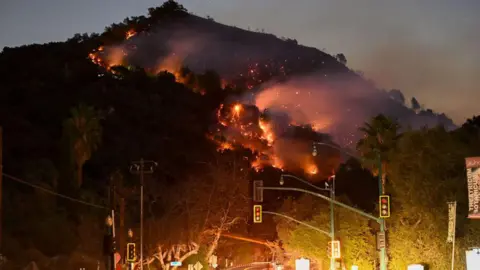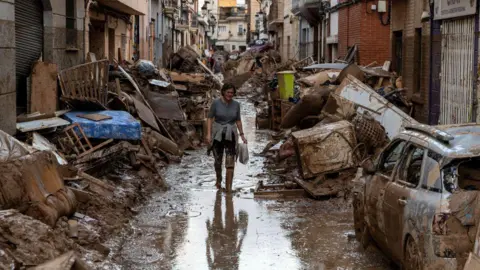Climate stripes updated for hottest year on record
 University of Reading
University of ReadingAn iconic depiction of global temperatures has been updated to represent the average global temperature for 2024.
The European Copernicus climate service said on Friday that 2024 was the hottest year on record, and the first to pass 1.5C warming - the threshold world leaders pledged to try and avoid in the 2015 Paris Agreement.
Prof Ed Hawkins from the University of Reading, who created the climate stripes diagram, said the figure was a "stark reminder" there was more work to be done to tackle climate change.
"We have the ability to turn thing around [but] we need to work harder," he said.
The stripes show the change in average annual global temperatures since 1850, with red indicating hotter years and blue cooler ones against the average of the period 1971-2000.
Prof Hawkins said they were designed to get people talking about the issue and encourage them to take action.
"We want people to look at the stripes, start a conversation, ask questions, and inspire others to act as well," he added.
 Getty Images
Getty ImagesHe said the figure for 2024 was "a worrying sign", and that extreme weather events - such as the California wildfires or the Valencia floods in the autumn - would only "become worse".
"We will see hotter heatwaves around the world, we will see heavier rainfall events which increases the risk of flooding," he said.
"I worry abut the kids and grandkids of the future who are going to have to live with worse consequences if we don't take very rapid actions over the next few years."
But he said it was not just a problem for the future.
"We're already seeing the consequences today," he said.
 Getty Images
Getty ImagesBut, despite the warnings, Prof Hawkins said all was not lost.
"We have the ability to turn thing around," he said.
"We are causing this problem, which means we have the ability to solve it."
He encouraged people to think about how they heated their homes, what modes of travel they choose, and what food they eat.
"These are choices that we can all make ourselves to make a difference, and then when we look back from 20, 30, 50 years in the future, we'll be able to say 'yes, we took those actions that were needed at the time'," he said.
You can follow BBC Berkshire on Facebook, X (Twitter), or Instagram.
